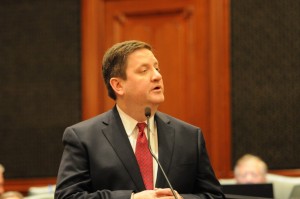State open meetings, consolidation bills locally connected
Gregory Harutunian — June 7, 2015
State Rep. David McSweeney (R-Barrington Hills) authored and sponsored the legislation to amend the ability to report violations of the open meetings act, and it awaits Gov. Bruce Rauner’s signature to become law.
Two state bills, one dealing with changes to the open meetings act, and another concerning McHenry County government consolidation, both sponsored and authored by local legislators may be reaching fruition, despite various hurdles along the way. The former sits on Gov. Bruce Rauner’s desk awaiting signature, and the latter will be pushed for a senate vote in the summer legislative session.
State Rep. David McSweeney (R-Barrington Hills) authored House Bill 175, and is “…aimed at making reporting violations of the open meetings act more reasonable and accommodating,” according to a press release issued by his office. The bill was approved unanimously by the Illinois Senate May 30, and unanimously passed in the Illinois House May 31, with slight amendments.
The bill permits the reporting of an open meetings act violation within 60 days from the discovery of an alleged violation. The extant law permits reporting of such violations within 60 days from an alleged violation. The key change is the word, “Discovery,” and resulted from the 2014 meeting between members of the Village of Oakwood Hills Board and developers of a power plant, behind closed doors.
The subsequent project approval by the board set in motion a community uprising against the construction, and discovery of the meeting, prior to the vote. The statute of limitations had already exceeded the 60-day time period for the filing of a violation notice. Sweeney’s bill was one of the few pieces of legislation to emerge from the state sessions, and awaits Rauner’s signature to be enacted into law.
“I feel very good about that happening, and I have to acknowledge the work of Sen. Dan Duffy (R-Lake Barrington) for his work in the senate,” said McSweeney. “It started with the discovery of the Oakwood board coming to terms with the developer, and unfortunately, it was already 60 days past the meeting when they found out about it.
“The residents couldn’t act on an open meeting violation. As I said in the release, the open meetings act was designed to increase government transparency, not give communities a reason to avoid their responsibilities to the citizens they serve.”
The bill, as written, states: “… Amends the Open Meetings Act. Provides that a request for review may be filed not later than 60 days after the discovery of an alleged violation of the Act (instead of 60 days after the alleged violation) if facts concerning the violation are not discovered within 60 days after the alleged violation but are discovered at a later date by a person utilizing reasonable diligence. Effective immediately.”
Phone attempts to contact Oakwood Hills officials for comment were not successful, and email inquiries were not returned.
On the other hand, House Bill 229 was introduced last April, by State Rep. Jack Franks (D-Marengo). It seeks to give authority to the McHenry and Lake county boards to eliminate a taxing body lying completely within its county boundaries, and of which, appoints a majority of the trustees to that governmental unit. The exception is a fire protection district with full-time personnel.
Franks was tabbed to join Rauner’s the Local Government Consolidation and Unfunded Mandates Task Force, a 25-member group charged with identifying issues with local government and school district consolidations, and their inherent redundancy. It was signed into existence by Rauner on Feb. 17, through an executive order.
Frank’s bill was approved by the Illinois House, and passed through the Senate’s Executive Committee with assistance from Senate President John Cullerton, before missing a deadline for full senate vote, at the conclusion of the spring legislative session.
State Sen. Pam Althoff (R-McHenry) has allegedly provided impediments to the bill, despite signing on as the senate sponsor, over concerns the measure could eliminate the McHenry County Mental Health Board, and the McHenry County Conservation District. Cullerton also authored a separate, but companion consolidation bill, House Bill 245, exempting conservation districts which was approved by the senate, and currently rests in the House.
Franks has said efforts on his bill would continue throughout the Illinois General Assembly summer session, as budget debate continues. In 2013, the authority to eliminate local government units was afforded to DuPage County. Lake County was added to the McHenry County version, at their behest, in order to obtain the same powers.
“Illinois has the most units of government anywhere, and we all have to look at ways to be more efficient,” said Lake County Board Chairman Aaron Lawler, replying in an email. “In Lake County, we have made cuts and put efficiencies in place and this bill would give us the discretion and ability to consolidate government services where it makes sense to be more efficient and save money.”
The Lake County Board has been steadily moving toward austerity programs, with spending cuts, while bolstering essential services to county residents.
McSweeney, state Rep. Barb Wheeler (R-Crystal Lake), and in the Senate, Duffy, have supported the measure, “I voted for it … I supported it, being against government misspending, the less government, the better,” said McSweeney. “It gives the same authority as DuPage County to make reductions.”



